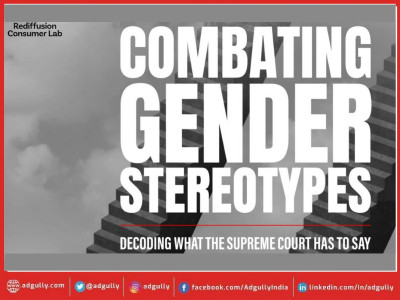Rediffusion’s Red Lab report: Exploring gender stereotyping & SC handbook
The Supreme Court of India recently released a handbook on Gender Stereotyping. The handbook is a ready reference for judges and lawyers to help them identify and avoid using harmful stereotypes. It is a valuable tool for anyone who wants to ensure that the law is applied fairly and justly to all people, regardless of their gender. Rediffusion’s Red Lab has come up with a report on gender stereotyping. Aishwarya Metrani, creative brand strategist at Rediffusion’s Red Lab, delves deep into the SC handbook.
What is a stereotype?
A stereotype is a belief or idea about a group of people that is not always true. Stereotypes can be about race, gender, nationality, religion, or any other group. They are often negative and can lead to discrimination and prejudice.
How do stereotypes work?
According to the report, stereotypes can work in two ways. First, they can influence how we think about people from a particular group. For example, if we believe that all Indians are
good at math, we might be more likely to assume that an Indian person we meet is good at math, even if we don't know anything else about them. Second, stereotypes can influence how we treat people from a particular group. For example, if we believe that all women are weak, we might be less likely to hire a woman for a job that requires physical strength. The impact of stereotypes. Stereotypes can have a negative impact on people's lives. They can lead to discrimination, prejudice, and violence. They can also make it difficult for people to reach their full potential. Stereotypes are oversimplified and generalized beliefs about certain groups of people, often based on biases or misinformation. When incorporated into language, these stereotypes can perpetuate discrimination, reinforce prejudices, and promote inequality. They can lead to miscommunication, as individuals may feel misunderstood or marginalized due to being categorized into a stereotype that doesn't accurately represent them. Using stereotype language too can hinder open-mindedness and hinder our ability to truly understand and appreciate the diverse experiences and perspectives of others Stereotypes are so deeply ingrained in our society and thought processes that now it is difficult to understand when we stereotype someone. It is very subtle and plays on a subconscious level. It affects our judgments
and the way we see people. The impact of stereotypes. Stereotypes can have a negative impact on people's lives. They can lead to discrimination, prejudice, and violence. They can also make it difficult for people to reach their full potential. Stereotypes are oversimplified and generalized beliefs about certain groups of people, often based on biases or misinformation. When incorporated into language, these stereotypes can perpetuate discrimination, reinforce prejudices, and promote inequality. They can lead to miscommunication, as individuals may feel misunderstood or marginalized due to being categorized into a stereotype that doesn't accurately represent them. Using stereotype language too can hinder open-mindedness and hinder our ability to truly understand and appreciate the diverse experiences and perspectives of others. Stereotypes are so deeply ingrained in our society and thought processes that now it is difficult to understand when we stereotype someone. It is very subtle and plays on a subconscious level. It affects our judgments and the way we see people.


















Share
Facebook
YouTube
Tweet
Twitter
LinkedIn